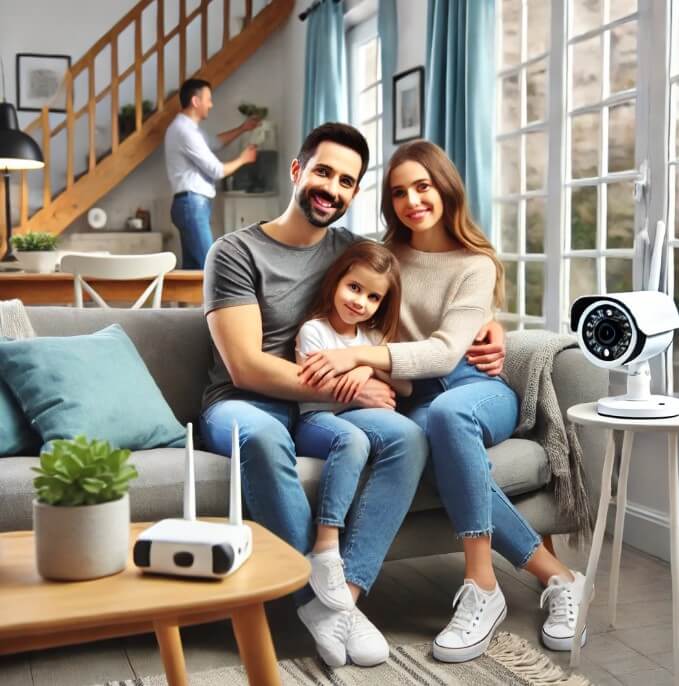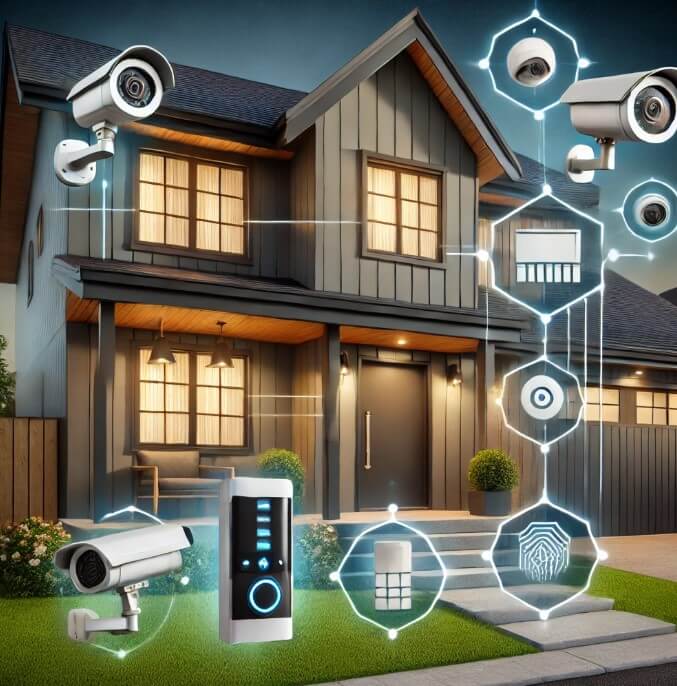Owning a security system for your home, family, and personal belongings is more than just having some devices, it is a way to manage risk efficiently, and as such an approach is multi-faceted, this article examines the risk management aspect of having a security system in your house, ensuring protection, loss prevention and improving one’s state-of mind.
Introduction: Why Installation of a Home Security System is Necessary
No one could ever be sure that an act of burglary, vandalism, or any such emergency would happen to them, it is just a risk that comes with being a homeowner, therefore, it is necessary to take precautionary measures. In addition to reducing the chances of such risks, a security system provides the capacity to lessen the effect of their surprises. To minimize the risk of the owners losing their most valued assets, it will be essential to comprehend how such a system functions in the context of risk management
Definition of Risk Management and Its Relevance in Home Security

Risk can be reduced and managed by both assessing and understanding it, as well as mitigating it. Applying the principles of risk management would entail:
- Risk Monitoring: Identifying risks of theft, illegal access, and other related natural events.
- Risk Control: Employing appropriate equipment and devices to lower the risks such as alarms, cameras, and sensor systems.
- Risk Transfer: Such as availing of insurance offers and discounts offered by the security agencies for clients with security systems installed in their homes.
Installing security systems encompasses great risks and gives the homeowners a wider scope to live with.
Components of a Home Security System
A home security system comprises several components, each designed to cover particular risks formulated:
- Alarms and Sensors: Detect intrusion into its perimeter or fires and floods inside the building.
- Surveillance Cameras: Surveillance would involve inspecting internal and external homes in real time.
- Locks: Restrict entry to specific groups while allowing control access over the object through a mobile tool.
- Motion Detectors: Warn customers of unusual alterations in movement and add to perimeter protection.
- Security Alerts: Inform the authorities and the customers in the event of an emergency.
Each of these elements complement each other to encompass risk management strategy in its entirety.
How Does a Security System Serve as a Risk Management Strategy?
- Deterrence of Criminal Activities
Intruders are discouraged by cameras being in the homes and alarm signs being clearly visible which means the CCTV is on, likely the alarm is on as well. Homes with adequate security features in place are less appealing to prior criminals during the act of home robbery.
- Immediate Threats
The presence of sensors and cameras of homes allows for the detection of intrusion and any unusual activity hence gives room to fast responses to most likely.
- Decreased Damages
It is true that repairing or replacing the smashed doors and broken windows can be expensive, but security systems also assist greater by deterring the act of break-ins and vandalism in the first place. Furthermore, it is customary for many insurance firms to offer discounts on their premiums for homes with a security system in place.
- Now More Prepared than Ever for Emergencies
Last but not least, security systems have come a long way from just being pistols and locks to dual security systems with fire alarms, smoke, and carbon monoxide sensors. Now, that’s inclusive insurance I bet we all would love to have and give to our loved ones.
- Well Deserved Peace of Mind
Having a 24/7 security assured makes one not be in constant worrying about the safety of their home and can focus on the more important aspects of life.
Reasons Why You Should Install A Security System at Home
| Benefit | Description |
|---|
| Crime Prevention | Visible security systems deter intruders. |
| Insurance Discounts | Many insurers offer lower premiums for secured homes. |
| Remote Monitoring | Monitor your home from anywhere via smartphone apps. |
| Emergency Alerts | Receive notifications for fire, flood, or intrusion emergencies. |
| Increased Property Value | Homes with security systems are more attractive to potential buyers. |
What Should Encourage the Purchase of a Security System?
When selecting what security systems are the best, the following factors may be important:
- Expansion: It is important to choose a system that can accommodate growth of security needs to suit the future.
- Compatibility: Security systems for smart homes that link up with other smart home devices are a great innovation and you can also find them.
- Monitoring Service: The most important part of security systems must be a monitoring service that offers 24 hours services.
- Simplicity of Operation: Ease of use is sometimes rather important within the security system especially for non-technical persons.
How to Improve the Effectiveness of A Home Security System?
These are some recommendations to ensure you maximize on your security system:
- Devices must be updated regularly with the new firmware and new updates of the software.
- Cameras must be placed within the reachable vulnerable areas to cover all the important elements.
- All alarms and sensors must be tested regularly to ensure it is functioning properly.
Make sure all members of the family are well trained in the proper use of the system.
Common Myths About Home Security Systems: Debunking The Myths
Myth 1: Security Systems Are Unaffordable
Most of the modern systems can be conveniently purchased at a particular price range.
Myth 2: Only The Computer Savvy Can Use Them
Many systems boast of having friendly interfaces that do not require extensive knowledge of the equipment.
Myth 3: They Frequently Have False Alarms
An average number of false alarms can be drastically lowered with proper installation and maintenance of the alarm system.
FAQs: Understanding How Is Having a Security System for Your Home a Risk Management Strategy?
What Are The Risks Addressed By Home Security Systems?
The range of threats addressed by home security systems include theft, unauthorized entry, fire outbreaks, carbon monoxide poisoning and water leaks.
Is The Cost Of A Security System Justified?
Definitely, They Lower The Chances Of Occurrences, And In Most Cases They Keep Insurance Premiums Low.
Do Security Systems Need The Assistance Of An Expert For Installation?
A number of systems have components that can be installed without engaging a professional; However, professional supervised assembly guarantees the best location and operation of the system.
Is It Possible To Use My Phone And View My Security System Remotely?
However, most systems are equipped with mobile applications that enable quick and easy monitoring and control of the system.
Which Characteristics Are Essential For A Home Security System?
Important features include cameras, sirens, motion sensors, and automatic emergency notifications.
Final Words: Accepting Security Systems as a Necessity
Installing a security system in your home is a convenient and smart way of reducing risks. Not only does the system provide protection from threats but it is also financially advantageous and ensures that one is at ease. Understanding the systems of security and its advantages enables owners to protect their real estate and other dear ones effectively to appropriate extent.
A combination of appropriate tools, practices and technologies is the best way to ensure that your house is also a stronghold guaranteeing optimum safety and welfare for any future years too.


